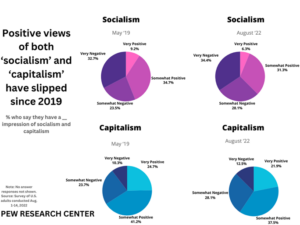
What are your first thoughts when you hear the word “capitalism?” Take a moment to ponder.
Next, what are your first thoughts when you hear the word, “socialism?” Give yourself a minute to reflect on the word.
Does one word have a positive connotation and the other a negative one? Do both words evoke a neutral response for you?
If you are reading this, you are probably a budding sociologist and know that the society we grow up in will significantly mold and shape us. Growing up in a capitalist economy will impact us differently than residing in a socialist economy. Therefore, the way we think about the world will be a result of our socialization, the process by which one learns the appropriate attitudes and behaviors within a culture.
Let’s define both words to determine if you thought of typical textbook definitions or if you had a more emotional response. Capitalism is an economic and political system based on private control of the production and distribution of goods and services within a free market system. Socialism is an economic and political system based on the cooperative management of the production and distribution of goods and services by citizens within a democratic government.
 When you considered each word, you may have thought of concepts like pride, patriotism, disgust, liberalness, freedom, conservatism, laziness, and fairness. A 2019 Pew Research Center survey found that “socialism’s critics say it weakens work ethic; those with positive views say it fosters equality.” A 2022 Pew survey on the same topic found “[t]he American public continues to express more positive opinions of ‘capitalism’ than ‘socialism,’ although the shares viewing each of the terms positively have declined modestly since 2019.” An individual residing in the U.S. versus Finland, Denmark, or Venezuela would likely answer the survey questions differently. Those who believe socialism fosters equality will most likely view capitalism as creating social inequality, a system that unequally rewards individuals based on characteristics such as sex, income, age, race, and ethnicity. Capitalism can be viewed as giving citizens more opportunity and freedom and promoting innovation. Socialism may be viewed as a fairer system that is more likely to take care of the basic needs of the majority of citizens.
When you considered each word, you may have thought of concepts like pride, patriotism, disgust, liberalness, freedom, conservatism, laziness, and fairness. A 2019 Pew Research Center survey found that “socialism’s critics say it weakens work ethic; those with positive views say it fosters equality.” A 2022 Pew survey on the same topic found “[t]he American public continues to express more positive opinions of ‘capitalism’ than ‘socialism,’ although the shares viewing each of the terms positively have declined modestly since 2019.” An individual residing in the U.S. versus Finland, Denmark, or Venezuela would likely answer the survey questions differently. Those who believe socialism fosters equality will most likely view capitalism as creating social inequality, a system that unequally rewards individuals based on characteristics such as sex, income, age, race, and ethnicity. Capitalism can be viewed as giving citizens more opportunity and freedom and promoting innovation. Socialism may be viewed as a fairer system that is more likely to take care of the basic needs of the majority of citizens.

As you can see, there are varying opinions of these economic and political systems. Let’s take a quick look at how the word “capitalism” is being used in different contexts, such as fair, market, surveillance, and green capitalism. For example, Columbia’s incoming finance minister wants “fair capitalism.” Jose Antonio Ocampo’s focus will be on increasing taxes on the rich so the government can spend more on poverty programs. Pope Francis stated that market capitalism failed us during the pandemic and needs reform. He said the “current political and economic institutions must be reformed to address the legitimate needs of the people most harmed by the coronavirus.” Shoshana Zuboff, a professor emerita at Harvard Business School, states that surveillance capitalism undermines autonomy — and democracy. She defines surveillance capitalism as the unilateral claiming of private human experience as free raw material for translation into behavioral data. The last example is green capitalism, which refers to blending the growth model of capitalism and the finite nature of our planet. Proponents argue that adapting this model will allow us to successfully address the perils of climate change. There are also critics of green capitalism, as Kate Knibbs, WIRED, explains in “Is ‘Green Capitalism’ Total BS?” A major critique is that corporations can engage in greenwashing, the promotion of being a sustainable and green company, when, in fact, sustainable practices are not the norm for the organization.
As these examples demonstrate, there are a variety of ways that the word “capitalism” is being used within different contexts. Based on the theory of symbolic interaction, a micro view of how society is the product of interactions between people, which occur via symbols that have distinct meanings, the word “capitalism” is symbolic and has a variety of distinct meanings, depending on the context. Therefore, consider that your peers’ “thoughts” about the words “capitalism” and “socialism” may be very different from yours, depending on the context and their socialization process. We hope you enjoyed this thought exercise!
Thompson is a co-owner of UITAC Publishing. UITAC’s mission is to provide high-quality, affordable, and socially responsible online course materials.
Images used in this blog:
- “Decorative cardboard illustration of hand with diagram and dollar coin” by Monstera Production is licensed on Pexels. This image has not been altered.
- Photo by Gerd Altmann is licensed on Pixabay. This image has not been altered.




